When Origen came to deal with [reading praefuisset instead of profuisset] this chapter, he urged us to seek out what information we do not possess; and because he had no leeway for allegorical interpretation, in which one may argue without constraint, but rather was restricted to matters of historical fact, he made this brief observation in the tenth volume of the Stromata: “We must quite carefully ascertain the amount of time between the first year of Darius, the son of Ahasuerus, and the advent of Christ, and discover how many years were involved, and what events are said to have occurred during them. Then we must see whether we can fit these data in with the time of the Lord’s coming.”
Category Archives: Senza categoria
Corso di Inglese files audio
Corso di inglese di Giuseppe Guarino. Files AUDIO
 |
Puoi acquistare il libro online su Amazon, Ibs, ecc. |
Lezione 1
Intermezzo: Introduce Yourself
Lezione 2
Lezione 3
Lezione 4
Intermezzo: Introduce Yourself
Intermezzo: Numbers
Intermezzo: Time
Lezione 5
Lezione 6
Intermezzo: la famiglia
Lezione 7
Intermezzo: Essere o Avere?
Lezione 8
Isaia 9:5 e la Deità del Figlio di Dio
di Giuseppe Guarino
Sto studiando Isaia in una edizione multilingue molto bella (italiano, greco, latino ed ebraico interlineare) edita dalle Paoline. Il contatto con l’originale ebraico, ma anche con una versione così antica come la LXX è davvero emozionante, significativo, ci fa scoprire dettagli non subito evidenti nella traduzione. Qui esamino l’affermazione “Dio Potente” di Isaia 9:5.
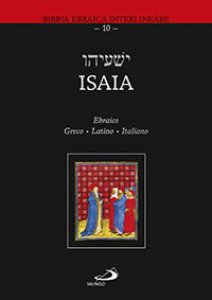
Isaia 9:5
“Poiché un bambino ci è nato, un figlio ci è stato dato, e il dominio riposerà sulle sue spalle; sarà chiamato Consigliere ammirabile, Dio potente, Padre eterno, Principe della pace…”
L’interpretazione messianica di questo brano è praticamente unanime. Esso è attribuito al Cristo che è Consigliere Ammirabile, Dio potente, Padre eterno, Principe della pace…
Gesù quindi è Dio. Ciò è inteso anche nell’Antico Testamento – come persino gli ebrei messianici di lingua ebraica credono, e proprio sulla scorta di affermazioni del tenore di Isaia 9 e altri brani messianici di questo libro meraviglioso.
Quando ai Testimoni di Geova viene presentato questo passo della Scrittura, ovviamente essi hanno da ridire, cercano delle scappatoie, delle possibili soluzioni che facciano dire alla Bibbia ciò che il loro organo direttivo sostiene, quello che l’organizzazione insegna – è la loro prassi.
I semplici cadono vittime di un errore che un esegeta, ma anche un intelligente lettore serio e motivato della Bibbia non può permettersi di commettere.
Chi legge la Bibbia, se ritiene che essa sia la Parola di Dio, la legge per capire cosa dice e conformare il proprio pensiero al suo insegnamento. Procedere in senso inverso, cioè trovare ogni possibile spiegazione per aggirare il senso letterale ed evidente di un brano per rimanere alle proprie idee preconcette è proprio la strada da non percorrere, è quella che ci allontana dalla Verità e da Dio.
Isaia insegna che il Messia è Dio?
La semplice risposta è: si.
Lo apprendiamo semplicemente leggendo il brano. Definire il bimbo nato, il figlio dato, come Dio (potente) già dovrebbe bastarci a farci ritenere che egli sia Dio.
A volte può sfuggire una semplice immediata regola per la comprensione di un testo: il testo dice quello che dice. Ma è proprio la prima da tenersi in considerazione. Poi, ovviamente, vanno considerati contesto, storico e letterario, circostanze, ecc.
I Testimoni di Geova mi hanno detto che Gesù è “dio potente” e non l’Iddio Onnipotente. Eppure la Traduzione del Nuovo Mondo traduce “Dio potente” qui, con la D maiuscola. Non è “un dio”, non è “divino”, è Dio, e Dio potente.
In ebraico Dio potente è
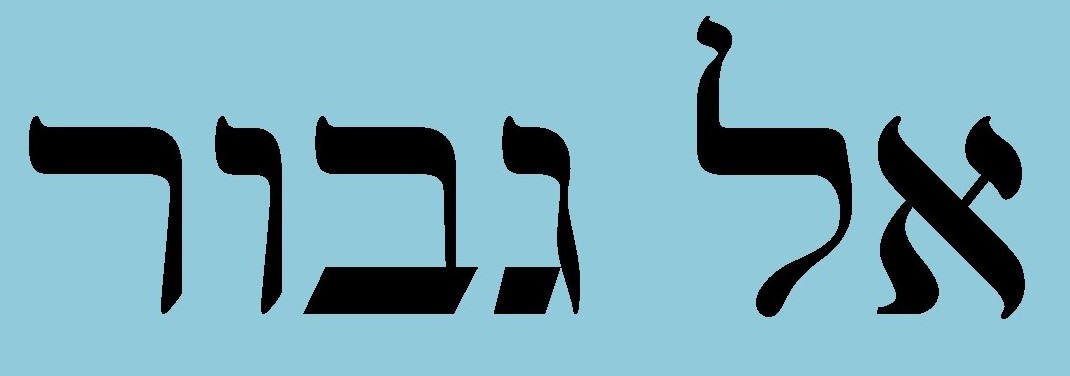 |
Nel nostro alfabeto: El Ghibbor |
Se questa affermazione non fa del Messia Dio, come possiamo spiegare che la stessa, la medesima, identica, poco più avanti, in Isaia 10:21 è inequivocabilmente riferita a Dio, a יהוה (Geova)?
Isaia 10:20-21 dice così:
“In quel giorno il residuo d’Israele e gli scampati della casa di Giacobbe smetteranno di appoggiarsi su colui che li colpiva, e si appoggeranno con sincerità sul SIGNORE (יהוה), sul Santo d’Israele. Un residuo, il residuo di Giacobbe, tornerà al Dio potente (אל גבור)”.
La Traduzione del Nuovo Mondo traduce così:
“Quel giorno i rimanenti d’Israele e i superstiti della casa di Giacobbe non si appoggeranno più a chi li colpiva, ma si appoggeranno a Geova, il Santo d’Israele, con fedeltà. Solo quelli che rimarranno, il resto di Giacobbe, torneranno dal Dio Potente“.
Geova è Dio potente (אל גבור); il Messia è Dio potente (אל גבור). Due più due fa quattro. Chi si vuole convincere a ogni costo che faccia cinque è il problema, non il dato oggettivo che il risultato sia quattro.
Per l’ennesima volta rimando al mittente quel fastidioso: Svegliatevi!
Nomi di Dio: יהוה יראה
di Giuseppe Guarino

Il “nome” di Dio che considereremo in questo articolo è
יהוה יראה
pronuncia:
Per una lettura in ebraico di Genesi 22.
kindle store
Protected: Kevin
The New Testament in Chronological Order
THE NEW TESTAMENT in Chronological Order
by Giuseppe Guarino

The following is the Introduction to the above version of the New Testament which has the 27 books arranged in chronological order.
We all know that the books in our Bibles are not arranged in any particular order. In particular, no discernable criteria can be distinctly identified in the way the New Testament books are presented.
Originally, the apostolic writings must have circulated independentely. Every church must have had the letters addressed to them by the apostles. They must have had copies of letters addressed to other churches, too.
Paul himself promoted this habit among the churches.
“And when this epistle is read among you, cause that it be read also in the church of the Laodiceans; and that ye likewise read the epistle from Laodicea” (Colossians 4:16).
The epistles to the Thessalonians are the earliest written by Paul. It is noteworthy to read there,
“Now we beseech you, brethren, by the coming of our Lord Jesus Christ, and by our gathering together unto him, That ye be not soon shaken in mind, or be troubled, neither by spirit, nor by word, nor by letter as from us, as that the day of Christ is at hand.” (20Thessalonians 2:1-2)
Some one must have tried to write a letter or letters and make believe they were written by Paul.
“Now concerning the coming of our Lord Jesus Christ and our being gathered together to him, we ask you, brothers, not to be quickly shaken in mind or alarmed, either by a spirit or a spoken word, or a letter seeming to be from us…” (2 Thessalonians 2:1-2)
It looks like a negative thing. It is. But not entirely. In fact, for this reason the Church must have soon felt the importance to develop a critical spirit in order to identify the authentic and discard the spurious.
“See with what large letters I am writing to you with my own hand” (Galatians 6:11).
The matter with the Galatians was so important that Paul himself wrote this letter, so that there could be no doubt about the authorship of its content.
We understand that Paul must have dictated other epistles instead of personally write them. In fact he made sure to put his personal seal to confirm his authorsip. See 1 Corinthians 16:21, Colossians 4:18, 2 Thessalonians 3:17, Philemon v.19.
Going back to our main theme, chronology, we must say that Mark and Luke must have been written very early. Though many still believe that Matthew was the first of the Gospels to be written. Many also believe the original version of this book was in Hebrew and that only later a Greek version appeared on the scene to complete the narrative of the other two gospels already mentioned. The three would be called Synoptics, because of the clear resemblances among them.
The other “books” came later.
Imitating the Canon of the Old Testament was inevitable. The Church had to have, like Israel, their own Scriptures to state and proclaim the Truth of the Gospel. It was natural for the Church to choose among the many writings produced in the first century and retain the authentic. It was very soon clear that the main characteristic of the Old Testament was true for the apostolic writings too, they are the inspired Word of God.
“… even as our beloved brother Paul also according to the wisdom given unto him hath written unto you; as also in all his epistles, speaking in them of these things; in which are some things hard to be understood, which they that are unlearned and unstable wrest, as they do also the other scriptures, unto their own destruction.” (2 Peter 3:15-16)
Peter lists Paul’s epistles among the Scriptures!
I believe the apostles had a clear understanding of how to make sure the Truth could be preserved and handed down to future generations.
“Yea, I think it meet, as long as I am in this tabernacle, to stir you up by putting you in remembrance; Knowing that shortly I must put off this my tabernacle, even as our Lord Jesus Christ hath shewed me. Moreover I will endeavour that ye may be able after my decease to have these things always in remembrance.” (1lPeter 13-15).
The apostles took their ministry very seriously – they even paid their faithfulness to Jesus’ mandate with their lives, sealing their witness by their blood. They made sure their report would not be lost or corrupted by false witness, when they would go. Evidence of their love for Truth and wise conduct is in your hands every time you read the New Testament.
The early Church identified twenty-seven books as inspired.
In this edition of the New Testament, we plan to present the books arranged in a chronological order.
Though no exact criteria can be seen in the way the books are usually arranged, we believe it is as good as any other and it is by no means binding.
For the Old Testament, Christians and Jews adopt two different ways of collecting the books. The writings are the same, but arranged with a totally different logic. The Jewish canon has Law, Prophets and Writings[1]. The Christian canon has the Law, historical and poetical writings, and the prophets, major and minor.
Basically, somehow the same logic of the Christian Old Testament was imitated when arranging the books of the New.
The Gospels come first. They are followed by the Acts of the Apostles. Then we find the epistles of Paul and the so called general epistles by James, Peter, Jude and John. The book of Revelation closes the Christian canon and is the last book of the Bible.
Can we try to put these same books in a chronological order?
This will be very profitable for the epistles of Paul, even for exegetical purposes. So, this is where we start to look for the chronology of the books of the New Testament. Since, the book of the Acts of the Apostles and the details found in the epistles themselves give us a reliable starting point to determine when was written what.
This is the most probable order of composition of Paul’s epistles.
| During the Second Missionary Journey -Acts 16:1-18:22 | ||
| 1 Thessalonians | 52 AD | from Corinth |
| 2 Thessalonians | ||
| During the Third Missionary Journey – Acts 18:23 | ||
| 1 Corinthians | Spring 57 AD | from Ephesus |
| 2 Corinthians | Autumn 57 AD. | from Macedonia |
| Galatians | Autumn 58 AD | from Macedonia |
| Romans | 58 AD | from Corinth |
| During Paul’s emprisonment in Rome – Acts 28:11-31 | ||
| Philippians | ||
| Ephesians | ||
| Colossians | ||
| Philemon | ||
| During the imprisonment or the possible liberation | ||
| 1 Timothy | ||
| Titus | ||
| 2 Timothy | ||
Of course, since the books of the New Testament were not dated, we cannot be dogmatic on our arrangement. What I propose here is a possible reconstruction.
My work is inspired by the ideas expressed by J. B. Lightfoot in his commentaries on the Greek text of Galatians and Colossians in particular.[2]
I also took into consideration internal evidence, using as best as I could my personal acquaintance with the New Testament. Of course, I took into consideration the writings of the so called Fathers of the Church and Eusebius’ Ecclesiastical History in particular. Modern authors were considered too, but, I am even sorry to say, I cannot agree with a liberal view and approach to the New Testament, or the date of its composition given by certain scholars.
Whatever some may say, like the liberal scholar John A. T. Robinson had to admit in his “Redating the New Testament”, no book of the New Testament could have been written later than 70 AD. This statement, to my knowledge, is the most probable ever made on considering the dates of composition of the New Testament books.
Concerning the Gospels of Mark and Matthew, I have been strongly influenced by the amazing work of Jean Carmignac, The Birth of the Synoptic Gospels. He is absolutely right in seeing how dependable the Synoptic were from the Hebrew language. I do not agree totally with all his conclusions, but the strong semitic element agrees with placing the composition of the Gospels at a very early stage of Christianity.
I wrote a book on cave 7’s Greek manuscripts at Qumran. 7Q5 is a fragment that Josè O’ Challagan first identified as the few lines surviving of a copy of the Gospel of Mark. Many other scholars followed in O’ Challagan’s footsteps. Thiede, Montevecchi, just to name two. If 7Q5 is really a copy of Mark, this means this Gospel cannot have been written later than 50 AD, which is the latest possible dating given by scholars for this fragment. For sure, historically speaking, it could have never been copied later than 68 AD, because by that time the site was abandoned because of the Romans attacks that led to the distruction of the temple and the city of Jerusalem in 70 AD.
2 Corinthians 8:18 [3] identifies Luke as “the brother, whose praise is in the gospel throughout all the churches.” (KJV)
This passage can also be translated “the brother, whose praise is because of the Gospel throughout all the churches.” Some versions prefer not to be so literal and render the Greek as follows: “With Titus we are also sending one of the Lord’s followers who is well known in every church for spreading the good news.” (CEV) This is not a translation but an interpretation. Another version: “the brother who is famous among all the churches for his preaching of the gospel.” (ESV).
The literal version is the correct one. Luke was never famous for the preaching of the Gospel. Nowhere in the New Testament we read of any specific ministry he had. He is said to have accompanied Paul in his journeys. On the contrary, Luke’s Gospel, written Gospel, was very famous among the Gentiles, to whom it was clearly addressed. The reason why some translations render this passage in a non-literal way is to avoid the possible understanding of an early date of Luke, usually dated by critics much later than the Christian tradition always affirmed. Also, another objection is connected to the possibility of such an early use of the word “gospel” to describe a written account of the life and ministry of Jesus. Well, this could as well just be evidence of an early accepted way of using this term.
In short, critics cannot determine interpretation or translation of a passage to suit their theories. But, theories must be formed giving the Bible the credibility it diserves. And the New Testament here says openly that the Gospel of Luke was already written and known among Christians.
The New Testament as we know it is the result of a close scrutiny of the early Church, which, it is true, was made of local, independent churches. But, at the same time, they were all well connected and able to carry out the task of preserving the Truth, isolating and rejecting the lies. Only the Church of the first centuries was in a position to successfully adopt as Canonical the authentic, inspired books of the new covenant and reject the spurious.
The statement we find at the end of our Bibles, somehow can be extended to the Scriptures in general:
“I warn everyone who hears the words of the prophecy of this book: if anyone adds to them, God will add to him the plagues described in this book, and if anyone takes away from the words of the book of this prophecy, God will take away his share in the tree of life and in the holy city, which are described in this book.” (Revelation 22:18-19).
For this edition of the New Testament we chose the King James Version, probably the most elegant and reliable version of the Bible in English ever printed. It is literal, which is very important. It was not influenced by this or that current of thought. I believe this is vital.
I understand the English of this Bible is not modern and some parts of it may be a little difficult to understand, obscure for today’s English speaking people. But it is worth the while to try to dive into it and enjoy a literary masterpiece, because that’s what it is. Eventhough I am not a native speaker, I love the English language and this version is an unsurpassed masterpiece.
I am sure God will bless the reading of His Word to those who approach it with a sincere heart, aware of its nature and purpose.
“…And we also thank God constantly for this, that when you received the word of God, which you heard from us, you accepted it not as the word of men but as what it really is, the word of God, which is at work in you believers” (1 Thessalonians 2:13).
NOTES
________________________________
[1] Infinity is reprinting the JPS Old Testament following the Jewish Canon.
[2] Both recently reprinted by Infinity.
[3] The original Greek text of this passage says: “τὸν ἀδελφὸν οὗ ὁ ἔπαινος ἐν τῷ εὐαγγελίῳ διὰ πασῶν τῶν ἐκκλησιῶν”.
The Name of God in the English translations of the Old Testament
The Name of God in the English translations of the Old Testament by Giuseppe Guarino
The difficulties connected with the personal Name of God revealed to Moses (Exodus chapter 3) are as old as the need to translate the Old Testament in another language.
The oldest known version of the Hebrew Bible is the Greek translation, the Septuagint, LXX. This version – originally of the Pentateuch only – was sponsored in the third century BC by the Egyptian ruler Ptolemy Philadelphus to enrich the library of Alexandria. The name (meaning Seventy) derives from the legendary original number of translators engaged in this work.
There are controversial ideas as to which path the LXX took concerning the Name. Some argue that the translators preferred to keep the Tetragrammaton, God’s Name, in its original Hebrew form, and simply inserted it into the Greek text. Others argue that the original translation had Kyrios (ie “Lord”).
Whatever the initial choice of those translators was, the difficulty of transposing from the Hebrew into another language such a precious word as the Personal Name of God is evident.
What is the best choice?
Let’s look briefly at the Hebrew original.
When God appeared to Moses, he said to him,
“ ‘I am who I am.’ Then he said: ‘Thus you shall say to the children of Israel: ‘the I AM has sent me to you.’”
If God says in the first person that he is: “the I AM”, the others will have to turn to him calling him: “ י ה ו ה , the God of your fathers, the God of Abraham, the God of Isaac and the God of Jacob has sent me to you.”
הוהי is the way in which the name revealed to Moses is represented in the Hebrew alphabet. It identified the God who sent him to his people to deliver them from Egypt.
Hebrew is read from right to left. So if we want to transliterate the Hebrew letters in our alphabet, we will have:
י ה ו ה
H W H Y
Hebrew is written from right to left. So, applying our common sense of writing, we have: YHWH.
The four Hebrew consonants could also be transliterated with the following letters: IHVH, JHWH, or JHVH.
The “y” must be preferred to the “j” and “i” because the “j” has lost the original sound of “long i” in favor of the Anglo-Saxon valence of “g” and the “i” expresses the sound of the Hebrew letter but not the consonant valence, which instead happens with the “y”.
The “v” renders the phonetic value of Hebrew better than the “w” does, though “w” is a more correct way to transliterate.
So, the transliteration JHVH is not exactly the correct one, but has become, indirectly, in the use of Jehovah, the most popular form of transliteration of the Name.
Depending on the various texts that are consulted, one can find a version or another of the transliteration. The simple truth is that, as it is sometimes the case when translating from one language into another, no one can be dogmatic and different transliterations, for different reasons can be considered equally effective alternatives.
The four letters that together make up the Name of God in the Old Testament are commonly referred to as the Tetragrammaton (from the Greek tetra grammaton, which means four letters).
In the Hebrew alphabet (we will say for simplicity) vowels are missing. It is made up of only 22 consonants. The discomfort that can follow is easily understood and the correct pronunciation of words is linked to the teaching of one generation to the next of the way a word must be read.
The 22 consonants of the sacred text were considered too holy to even evaluate the possibility to transliterate them into another alphabet. So, the Masoretes, Jewish scholars of the first centuries, added some symbols, which helped the pronunciation of words.
The was vocalized as follows:
יְהוָֹה
While in the vast majority of cases the symbols provided by the Masoretes would give the reader the necessary vowels to be added to the consonants in order to determine the pronunciation of the words, for the Tetragrammaton scholars speak of qere perpetuum, that is, of “permanent corrections, not shown in the margin but inserted in the text through an anomalous vocalization”[1].
This happened because when the Masoretes added their vocalization, the Orthodox Jews had long ceased to read the Tetragrammaton, preferring to pronounce in its place the word “Adonai”, corresponding to the English “Lord.” The vowels of Adonai were then those added to the consonants of the divine name for the vocalization.
In the 16th century, a German scribe who was transliterating the Bible into the Latin alphabet for the Pope simply interleaved the vowels with the consonants resulting in the reading Iehovah.[2]
Later (in 1611) the King James Version of the Bible, introduced the reading Iehovah. This, with the evolution of the English language, became Jehovah by many still considered the pronunciation par excellence of the name of God. For sure, it is the most commonly known and used.
The affection that binds Anglo-American Christians to Jehovah has generated several attempts to systematically use it in biblical translations.
In 1901 the American Standard Version, used Jehovah in all the places where the Hebrew original of the Old Testament had the Tetragrammaton.
In the 1960s, Jehovah’s Witnesses produced their own translation of the Bible which introduced Jehovah into both the Old and New Testaments.
There have been versions of the Bible that have adopted various readings/transliterations, the most famous of which is probably Yahweh, that many scholars believe to be the correct way to pronounce the Name.
In Italy, my country, a translation of the early 1900’s, Riveduta Luzzi, came up with a peculiar solution. They translated the Name as “the Eternal” in a consistent way, throughout the Old Testament. I once thought this solution was totally crazy. But with a better knowledge of the original I have certainly changed my mind. The reasons are explained very well by Asher Intrater, in his book “Who ate lunch with Abraham?” Asher basically says – and he is a Jew and a Hebrew scholar – that the three vowels e, o, a, added by the Masoretes for the reading of הוהי are a verbal structure. The e (sh’va) indicates the future versal tense, the o (holom) the present and the a (patach) the past, giving the name YeHoVaH the meaning of “He will be, He is, He was,” in other words, the Eternal. I strongly suggest you get a copy of this great book. It is a masterpiece.
Today’s Italian version The New Diodati adopts this reading for the Old Testament occurrences of the Name.
“The Eternal” is a peculiar choice that seems to be exclusively and Italian phenomenon. The reason why I am calling this to the readers’ attention is that this use of the term “The Eternal” is not totally destitute of biblical foundation. I will say more later about this fascinating topic.
Anyway, the reading Jehovah and its variations, Yehovah or Yehowah, cannot be considered the right representation of the sound of the original Name, simply because the vowels inserted are those of a qere perpetuum that invite the reader to read out lout Adonai, Lord, when the Name of God is the the text.
We must be honest. Being often confronted with problems in translating from one language to another, I know: the translation of the Divine Name of Exodus 3 and following is a serious problem. Those who propose easy ways out do it only to please the public, but do not solve or even face the problem, they oversimplify the matter in order to achieve their own goals and follow their personal agenda.
What should we do when translating the Old Testament into another language?
We could just leave the original four Hebrew letters, as we find in some manuscripts of the ancient Greek version of the Septuagint. The problem, however, remains: how should we read it? Those who put the Name in the Hebrew alphabet in the LXX were – no question about it – Jews and thinking of Jewish readers of the Sacred Text. Their purpose was not proselytism outside of the Jewish circles. Their text would be read by people who knew they should pronounce the Name Adonai.
No translation from one language to another, and this applies to 100% of the cases, will be able, in several points, to perfectly render all the nuances of one language into the language in which it is translated.
This is also the case with the Name revealed by God to Moses, as well as other names of God given in the Bible. For example, “Lord” is the way we translate the Hebrew אדני, Adonai. Yet, just like אלהים, Elohim, which we translate God, is a plural form. This is peculiar of the Hebrew language and can’t be rendered in English. Also “sky” and “water” just to name two other examples are plural in Hebrew, but translated in the singular in English – see Genesis 1:1.
The very idea of the “name,” of a person or a thing, in Hebrew is not the same as that which conveys the term “name” in our language.
Many, if not all, of those who call God Jehovah do so with the Western idea of “name” in mind. That is why they are only incidentally bothered by the fact that Jehovah is not the real name of God, that it is not the way the Tetragrammaton was actually pronounced.
Although for us Gentiles, foreigners, is quite hard to swallow, הוהי is the exclusive patrimony of the original text of the Tanakh (the Old Testament), something that belongs to the Hebrew culture and language.
Most of the various attempts to recover in the translations the greatness of the biblical original of Exodus 3 and of the other references to the Tetragrammaton have merits, but they fail to convey the entirety of the meaning of the original to the reader who will not go to study firsthand the original languages of the Hebrew Scriptures.
I may be quite unpopular to say this, when we use Jehovah, we cannot think of this as God’s Name. It is an English word created ex-novo to translate the Name and pronounce it in a way we can as we speak English. It is quite handy. Yet, we must be aware that it is as good as any other English word we can try to use to render the Name. I believe the same applies to Yahweh.
Personally, as a translator, I believe that if we use “Lord” or “LORD” we give credit to the choice made by the Jews themselves, who, out of respect for the holy Name of God, avoid its pronunciation – who are we Gentiles to judge them concerning this matter?
Using “Lord” we also follow the lesson of the first translation of Torah ever, the Septuagint, and we are perfectly aligned with the Greek New Testament use in quoting the Old Testament.
[1] Giovanni Deiana and Ambrogio Spreafico, Guide to the study of biblical Hebrew, Urbaniana University Press and British and Foreign Biblical Society, p. 20.
[2] Source, jewfaq.org/name.htm
This article is the Introduction to my new book, THE NAME OF GOD
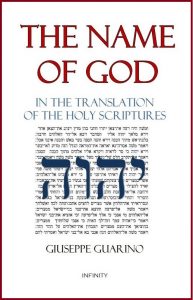
Alessandro Magno e il libro di Daniele
Alessandro Magno e il libro biblico del profeta Daniele di Giuseppe Guarino
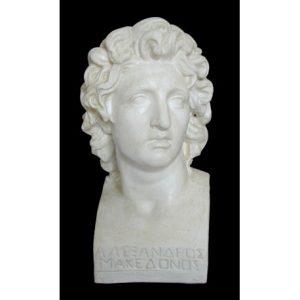
Qualunque sia l’approccio al libro biblico di Daniele, oggetto come pochi di controversie fra studiosi di varie fazioni, un solo dettaglio non è sfuggito a nessun commentatore: il fatto che il libro parli di Alessandro Magno. Lo fa in diversi punti e con descrizioni di sicuro interesse sia per lo studioso dei testi sacri sia per quello di documenti storici.
Nell’esame delle parole utilizzate da Daniele si rimane in bilico tra una possibile percezione del profetico nello storico e dello storico nel profetico. Vediamo perché.
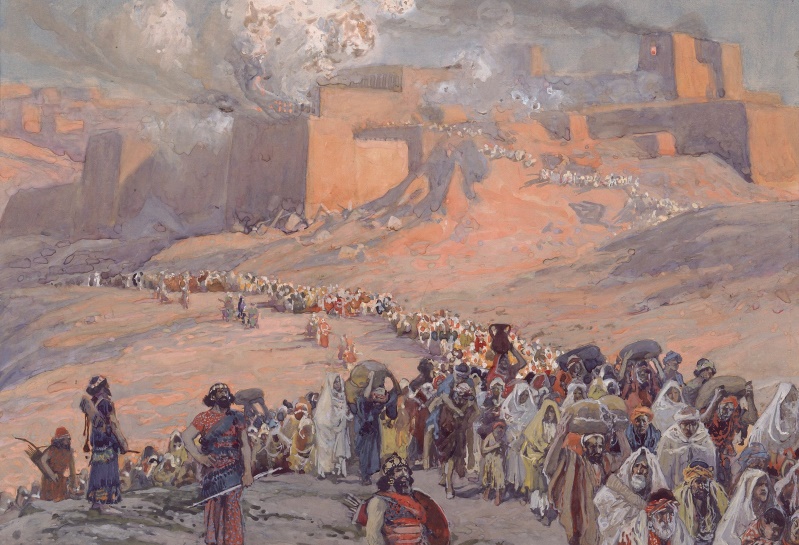
Daniele visse fra la fine del settimo secolo a.C. e per quasi tutto il sesto secolo a.C. Ancora giovanissimo venne deportato in Babilonia in una delle scorrerie del re babilonese Nabucodonosor. Venne quindi inserito nell’apparato statale babilonese con un certo successo, che gli permise di continuare nelle importanti cariche ricoperte persino dopo la conquista persiana.
Secondo il testo biblico che tramanda le vicende di questo profeta, egli possedeva un dono simile a quello di un suo illustre predecessore, Giuseppe, quello cioè di poter interpretare i sogni. Un dono che si trovò molto presto a dover manifestare per il re babilonese.
Un sogno che turbò Nabucodonosor lo spinse a cercare chi lo potesse interpretare. Nessuno vi riusciva. Fu un giovane – probabilmente ancora adolescente – di stirpe ebraica ad ardire di stare alla presenza del re, dirgli cosa aveva sognato e darne l’interpretazione.
Nei suoi tormentati sogni notturni il re babilonese aveva visto una gigantesca figura umana, composta da diversi materiali. Daniele li elenca e interpreta al re il significato simbolico di ciò che vede.

Daniele 2:37, 38: “Tu, o re, sei il re dei re, a cui il Dio del cielo ha dato il regno, la potenza, la forza e la gloria; e ha messo nelle tue mani, tutti i luoghi in cui abitano gli uomini, le bestie della campagna e gli uccelli del cielo, e ti ha fatto dominare sopra tutti loro: la testa d’oro sei tu”.
Il capo della statua in oro simboleggia Nabucodonosor e il suo regno.
Daniele 2:39: “Dopo di te sorgerà un altro regno, inferiore al tuo”.
All’impero neobabilonese succederà sulla scena mondiale quello medo-persiano di Ciro. Il quale rimarrà per molto tempo a predominare la scena mondiale.
“poi un terzo regno, di bronzo, che dominerà sulla terra”.
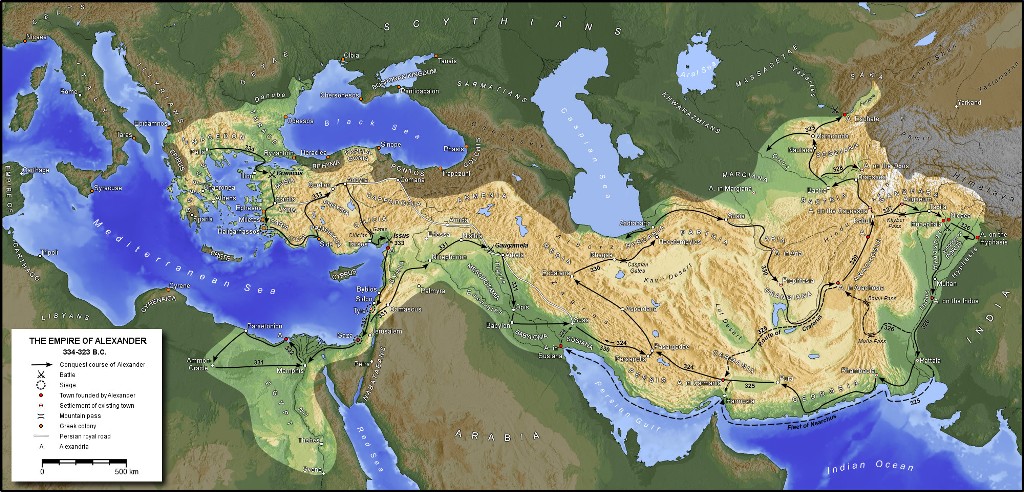
Ecco qui che compare il regno greco-macedone di Alessandro Magno. Subito colpisce la descrizione, davvero molto pertinente: “dominerà su tutta la terra”. Inarrestabile, il macedone riuscì a conquistare tutto il mondo allora conosciuto e la leggenda dice che pianse perché non vi erano più terre da conquistare.
Daniele 2:40: “poi vi sarà un quarto regno, forte come il ferro; poiché, come il ferro spezza e abbatte ogni cosa, così, pari al ferro che tutto frantuma, esso spezzerà ogni cosa”.
Daniele vede anche l’ascesa della potenza romana, riportando un dettaglio caratteristico di questo impero: la sua forza e inarrestabile avanzata.
Aver interpretato il sogno al re babilonese permetterà a Daniele, come fu per Giuseppe, di occupare presto un posto di tutto rilievo all’interno della corte.
Più avanti, nello stesso libro, sono descritte altre due visioni che completano la prima, arricchendola di dettagli che entusiasmano gli esegeti biblici, ma non meno gli storici.
Al capitolo 7 Daniele vede i medesimi quattro regni del sogno del re, ma stavolta nel simbolismo rappresentato da quattro diversi animali.
Il leone è Babilonia. L’impero persiano un orso. Il regno di Alessandro è visto come un leopardo.

Daniele 7:6: “Dopo questo, io guardavo e vidi un’altra bestia simile a un leopardo con quattro ali d’uccello sul dorso; aveva quattro teste e le fu dato il dominio”.
Sebbene con tipici connotati da vaticinio, la descrizione del regno di Alessandro e dei suoi successori è qui straordinariamente pertinente. Le ali d’uccello, infatti, descrivono la rapidità della inarrestabile conquista alessandrina: in soltanto dieci anni tutto il mondo era stato vinto. Le quattro teste il repentino smembrarsi dell’impero alla morte di Alessandro.
L’attenzione di questa seconda profezia di cui Daniele è ancora quasi passivamente depositario è, però, il quarto regno, quello di Roma. È invece nei capitoli che seguono, da 8 a 11 che il profeta si sofferma interamente sull’ascesa greca, dalla stessa figura di Alessandro, fino alle vicende delle monarchie elleniche che seguono, perché avranno un ruolo fondamentale per il destino di Israele, che si troverà proprio a metà strada fra due regni e le loro ambizioni, quelle dei tolomei e dei seleucidi.
In Daniele 8 leggiamo della nascita dell’impero greco-macedone. La stessa figura di Alessandro viene citata.
Daniele 8:5-7: “Mentre stavo considerando questo, ecco venire dall’occidente un capro, che percorreva tutta la terra senza toccare il suolo; questo capro aveva un grosso corno fra gli occhi. Il capro si avvicinò al montone dalle due corna, che avevo visto in piedi davanti al fiume, e gli si avventò addosso, con tutta la sua forza. Lo vidi avvicinarsi al montone, infierire contro di lui, colpirlo e spezzargli le due corna; il montone non ebbe la forza di resistergli e il capro lo gettò a terra e lo calpestò; non ci fu nessuno che potesse liberare il montone dal potere di quello”.
Nella descrizione del profeta viene detto qualcosa di straordinario: una potenza occidentale, la prima della storia dell’umanità, compare sulla scena medio-orientale. Essa avanza su tutta la terra in modo tanto rapido che non tocca nemmeno il suolo. Quale modo più appropriato di descrivere la rapidità della conquista di Alessandro, che in appena dieci anni prese possesso di tutto il mondo conosciuto.
Il grosso corno, nell’antichità simbolo di potenza, è proprio Alessandro Magno. Egli riuscirà a prevalere sulla potenza medo-persiana qui vista come un montone, e lo farà in modo rapido e definitivo.
Circa l’identità di questi simboli profetici non abbiamo alcun dubbio. Poco più in là nello stesso libro, infatti, troviamo l’interpretazione che perfettamente combacia con il dato storico.
Daniel 8:20-21: “Il montone con due corna, che tu hai visto, rappresenta i re di Media e di Persia. Il capro irsuto è il re di Grecia; e il suo gran corno, fra i suoi occhi, è il primo re”.
Da storico (dilettante) quale sono, mi sfugge il perché Daniele specifichi la presenza della componente dei Medi all’interno di un impero che certamente nella sua parte più eclatante vide senz’altro un deciso e netto prevalere dell’elemento persiano. Probabilmente, o la storia profana non ci permette di dare altrettanta rilevanza alla presenza dei Medi nell’impero o questa caratteristica viene esaltata per impedirci di confondere questo con qualsiasi altro regno che il lettore possa cercare di trovare nei simbolismi. Tale necessità è evidente nel fatto che qui venga dichiarata apertamente l’identità delle due potenze mondiali viste.
Giuseppe Flavio è uno storico giudeo vissuto a cavallo del primo millennio. Egli trasmette una lunga narrazione che getta ulteriore luce su alcuni dettagli, sul perché Alessandro risparmiò Gerusalemme, mentre dichiara indirettamente l’autenticità delle profezie di Daniele.
Antichità giudaiche, libro undicesimo: “E quando Alessandro ebbe preso Gaza, si affrettò verso Gerusalemme. […] Quando Alessandro fu in prossimità della città, il sommo sacerdote uscì in processione, con i sacerdoti e una moltitudine di cittadini. […] Essa raggiunse un luogo chiamato Safa, che, tradotto in greco (la lingua nella quale scrive lo storico, ndt) significa “prospetto”, perché da lì si ha una vista perfetta sia della città sia del tempio […] Quando Alessandro vide da lontano la moltitudine vestita di bianco, mentre i sacerdoti erano vestiti di lino, e il sommo sacerdote di porpora e scarlatto, con la sua mitra in testa che aveva la placca d’oro sulla quale era inciso il nome di Dio, egli si avvicinò e mostrò reverenza per quel nome e salutò il sommo sacerdote. E così fecero i giudei tutti insieme, con una sola voce, salutarono Alessandro […] Egli entrò nella città e quando salì nel tempio offrì dei sacrifici a Dio, secondo le direttive del sommo sacerdote, e trattò con onore sia il sommo sacerdote che gli altri sacerdoti. E quando gli venne mostrato il libro di Daniele, dove Daniele aveva dichiarato che uno dei greci avrebbe distrutto l’impero dei persiani, egli ritenne che si parlasse di lui”. Ho tradotto dall’opera The Works of Josephus, Complete and Unabridged, translated by William Whiston, A.M.
Purtroppo non solo la gloria di Alessandro, ma anche la sua altrettanto veloce caduta viene descritta in Daniele.
Daniele 8:8 “Il capro si irrobustì ma, quando fu al culmine della sua potenza, il suo gran corno si spezzò; al suo posto spuntarono quattro grandi corna verso i quattro venti del cielo”.
Daniele 8:22 “Le quattro corna, sorte al posto di quello spezzato, sono quattro regni che sorgeranno da questa nazione, ma non con la stessa sua potenza”.
Fu proprio così che accadde: al culmine della sua potenza e del suo successo, a trentatré anni, Alessandro morì, in Babilonia. Alcuni dicono per una febbre, altri sostengono per un complotto. Ad ogni modo, le parole di Daniele si avverarono alla lettera. Infatti non avendo eredi, furono i generali a spartirsi il grande impero, lasciandosi indietro, ovviamente, la magnificenza di quanto costruito da Alessandro. Ma, allo stesso tempo, continuando quell’opera da lui iniziata, l’ellenizzazione del mondo intero che ha determinato la cultura del mondo occidentale da allora fino ai nostri giorni.
Qui di seguito il libro che ho pubblicato anni fa su Daniele.
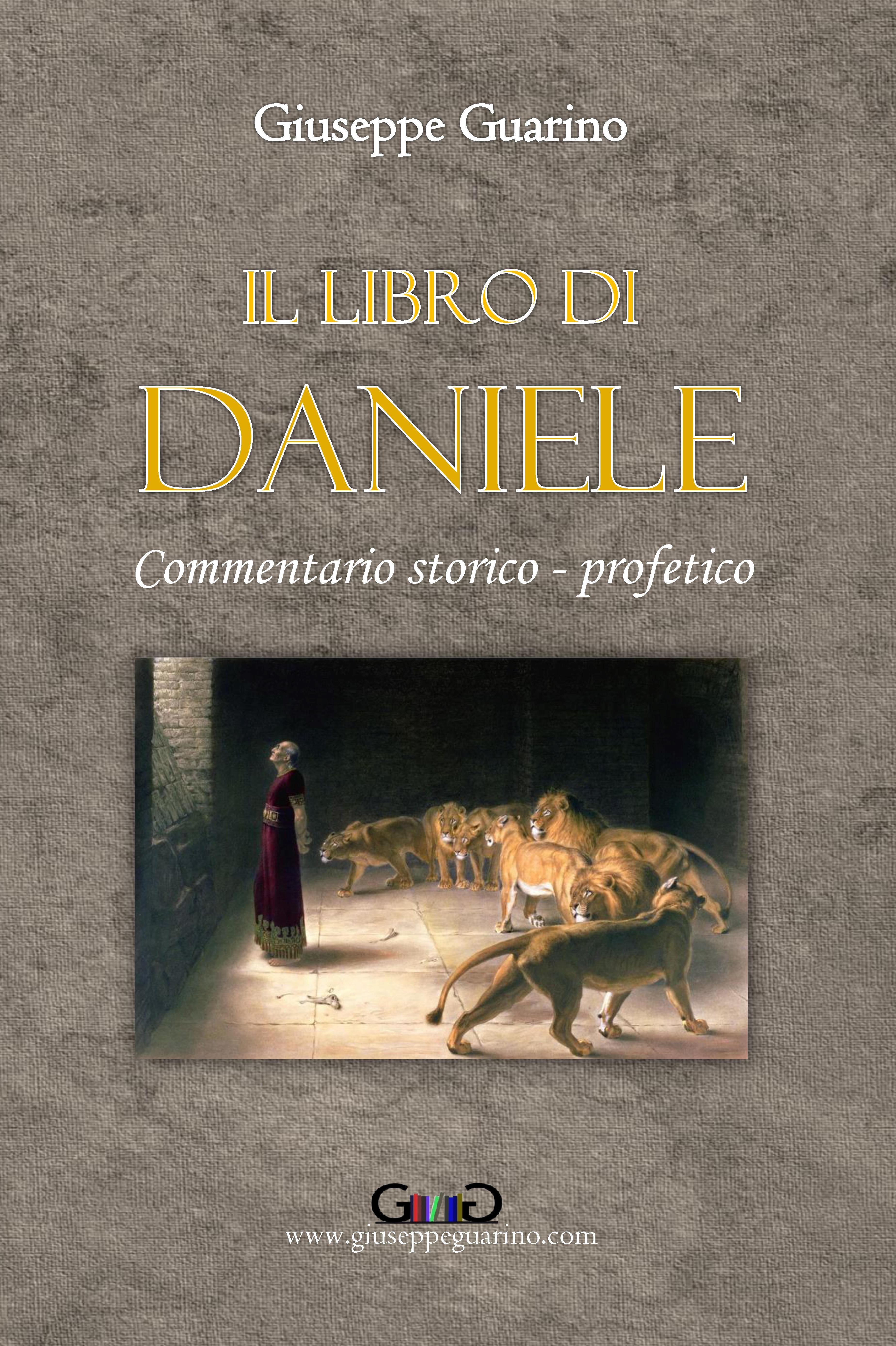 |
IL LIBRO DI DANIELE – Commentario storico-profetico – di Giuseppe Guarino
Lo studio del libro del profeta Daniele è essenziale per una corretta comprensione delle profezie messianiche sia della prima venuta del Messia sia del suo ritorno. Il commentario raccoglie informazioni storiche che attestano l’affidabilità del testo biblico, prove patristiche dell’antichità dell’interpretazione dei brani messianici e collegamenti con le profezie del Nuovo Testamento.
libro: https://www.amazon.it/dp/B08735HDFR
ebook: www.amazon.com/dp/B086MNFXT5
Amore per la Verità
AMORE PER LA LIBERTA’ di Giuseppe Guarino

Quanto amiamo la Verità? L’amiamo a sufficienza da essere pronti a sopportare le conseguenze che essa spesso porta con sé?
Gesù non ci ha mai mentito. Non ha detto che la verità ci avrebbe reso ricchi e nemmeno felici, ma liberi. Gesù dice sempre la verità, a chi lo ascolta, a chi lo vuole seguire. Anche a costo di perdere questo o quel discepolo.
Noi esseri umani raramente diciamo tutta la verità e spesso per paura di perdere i nostri amici o persone care. Per non metterci in aperto contrasto con chi la pensa diversamente. La verità la perdoniamo solo quando viene dalla bocca dei bambini. Spesso se qualcuno ci dice le cose come stanno, anche se sappiamo in fondo in fondo che quella persona ha ragione, storciamo il naso e forse ci sentiamo addirittura offesi.
Essere pronti ad accettare la Verità significa essere pronti ad accettarne le conseguenze. La libertà, poi, da che mondo è mondo, ha comunque un prezzo.
Nell’antichità lo schiavo poteva pagare per la sua libertà, letteralmente acquistarla.
Per questo la Scrittura ci dice: “sapendo che non con cose corruttibili, come argento od oro, siete stati riscattati dal vostro vano modo di vivere tramandatovi dai padri, ma col prezioso sangue di Cristo, come di Agnello senza difetto e senza macchia” (1 Pietro 1: 18-19). Come vediamo è proprio con in mente il possibile riscatto dello schiavo che Pietro spiega il prezzo che Cristo ha pagato per liberarci dalla schiavitù del peccato e per essere liberi di servire Dio.
Gesù stesso l’ha detto chiaramente: “Gesù rispose loro: «In verità, in verità vi dico: Chi fa il peccato è schiavo del peccato”.
Non facilmente l’uomo si accorge di essere schiavo del peccato. La più efficace catena è, infatti, quella che non si vede; e la più grande schiavitù è quella che riesce a darti l’illusione di essere libero.
Tempo fa uscì uno dei miei film preferiti, Matrix. Non so quante volte l’ho visto! Anzi, molto probabilmente, adesso lo andrò a rivedere. Una cosa che mi colpì furono i tanti riferimenti biblici, troppi per essere casuali. Riferimenti evidenti nei nomi dei protagonisti e non solo, ma anche meno evidenti nella narrazione stessa: un po’ una parabola della falsa libertà nella quale l’uomo odierno si vanta di vivere.
Il protagonista della storia a un certo punto incontra Morpheus che gli offre due opzioni: la pillola rossa o la pillola blu.
Sapere la verità ha un prezzo: rendersi conto che tutto ciò che fino a quel momento si pensava fosse vero, reale e libertà era invece soltanto una messa in scena, una schiavitù – a volte piacevole, ma pur sempre schiavitù.
In inglese c’è un detto: “Ignorance is bliss”. Noi in italiano diciamo: “beata ignoranza”. Ma in inglese è più incisivo: ignoranza è beatitudine.
In un certo senso lo conferma anche la Bibbia. Salomone fu un uomo saggio e sapeva: “Poiché dove c’è molta sapienza c’è molto affanno e chi aumenta la conoscenza, aumenta il dolore”. (Ecclesiaste 1:18)
Per questo dicevo all’inizio che bisogna amare la libertà per essere disposti a pagare il prezzo che comporta riconoscerla e accettarla.
Ma esiste UNA Verità? E, per essere ancora più diretti: esiste LA verità?
Pilato ebbe un dialogo con Gesù davvero significativo. Mi ha sempre affascinato e assume un ruolo non secondario nel Vangelo di Giovanni. Pilato aveva una mentalità “greca”, dipendente, come quella dei nostri giorni, da un sincretismo quasi necessario per adattarsi alla realtà multiforme che ci circonda. Eppure, sono convinto, che allora come oggi il nostro spirito in un certo senso si rifiuta di sentirsi acquietato dalla nostra razionalità e lotta per la ricerca di una Verità, insinuando sempre il dubbio che la Verità esista e sia conoscibile.
Pilato in tutta la drammaticità del rincorrersi degli eventi che seguono l’arresto di Gesù decide di avere un colloquio privato con lui. Lo interroga. “Per questo sono io nato, e per questo son venuto nel mondo, per testimoniar della verità; chiunque è della verità ascolta la mia voce”.[1]
Molto probabilmente questo dialogo si è svolto in greco ed è proprio la forza espressiva del greco che lo rende così intenso.
Pilato infatti chiede: “Cos’è Verità?” [2]
Gesù afferma di essere venuto nel mondo per testimoniare della Verità. La domanda di Pilato sembra mettere in dubbio che vi sia, che vi possa essere “una” Verità. Una maniera davvero attualissima di confrontare le affermazioni del Signore. Anche oggi, in un mondo intriso di sentimenti sincretisti e razionalità, la pretesa di Gesù e del cristianesimo viene mal vista. Eppure Gesù ebbe ad affermare con chiarezza: “Io sono la Via, la Verità e la Vita” (Giovanni 14:6), una frase che non sconvolgeva allora meno di quanto non sconvolga oggi.
Mi vanto di avere scoperto Egle Mirabella come scrittrice. Lo era prima di incontrarmi, sicuramente; ma non lo sapeva. Abbiamo studiato insieme un po’ di greco e quello che dice sulla Verità nel suo ultimo libro è davvero istruttivo: “La parola greca Aletheia greca è formata dalla “a” privativo e “Lethe” la dea del oblio, della dimenticanza”.[3]
(Il linguaggio di Egle è più complesso del mio. Lo spirito greco che guida la sua indagine è invece in me pragmatismo ebraico, mitigato da un universalismo greco che è l’espressione del mio desiderio di essere compreso e dal bisogno di rendere il messaggio evangelico il più comprensibile possibile.)
La parola greca “verità” ha in sé i due latenti significati: è qualcosa che ci priva dell’oblio. Ciò ci riconduce a quanto abbiamo detto all’inizio. Ma allo stesso tempo Egle ci segnala una cosa in più, la Verità ci fa ricordare chi siamo davvero, da dove proveniamo. La Verità ci riporta, ha in sé la forza di riportarci allo stato di libertà di cui godevano in quel primordiale giardino, quando Dio camminava con noi e nulla turbava il nostro stato di comunione con lui.
Gesù quindi disse in maniera lapidaria: “Conoscerete la Verità e la Verità vi renderà liberi” (Giovanni 8:32).
Quanto è grande il nostro amore per la verità? Lo è al punto di essere pronti ad affrontare le spiacevoli conseguenze che il sapere potrebbe comportare?
_______________________________________________________________
NOTE
[1] “ἐγὼ εἰς τοῦτο γεγέννημαι καὶ εἰς τοῦτο ἐλήλυθα εἰς τὸν κόσμον, ἵνα μαρτυρήσω τῇ ἀληθείᾳ. πᾶς ὁ ὢν ἐκ τῆς ἀληθείας ἀκούει μου τῆς φωνῆς”.
[2] τί ἐστιν ἀλήθεια;
[3] Egle Mirabella, Veritas, Aletheia, Apokalipsis, p. 112, Infinity Books, 2021.

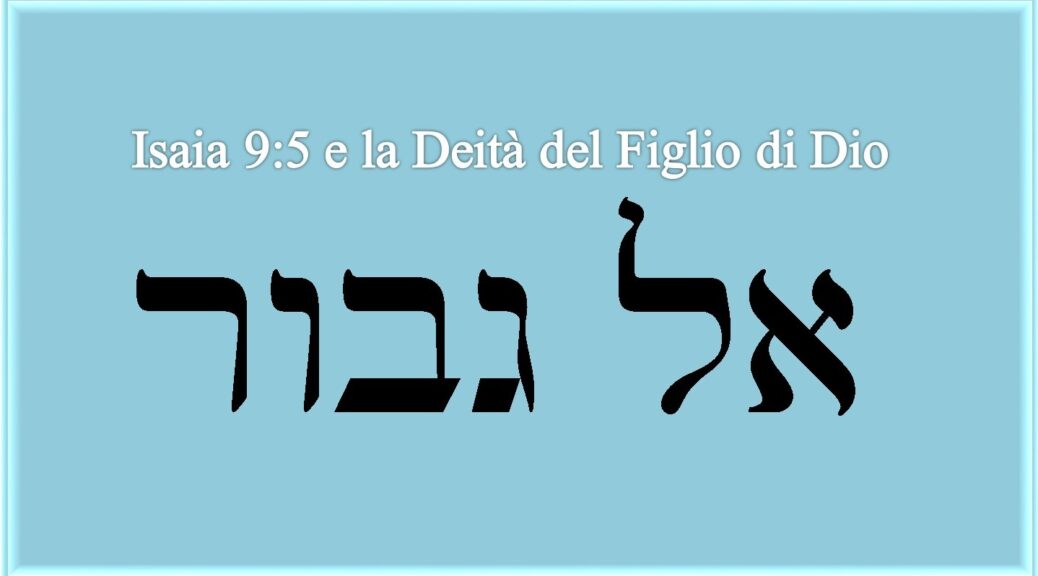
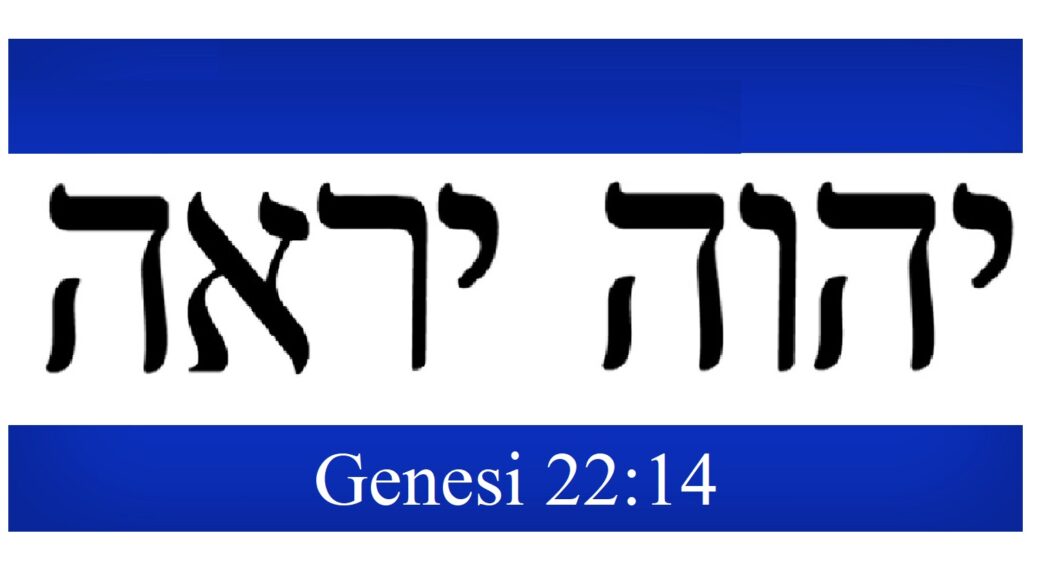

![The Jehovah's Witnesses' Bible: An Evaluation of the Text of the New World Translation by [Giuseppe Guarino]](https://m.media-amazon.com/images/I/41nkcuKf+SL.jpg)
![The Majority Text of the Greek New Testament: In defense of the Traditional Text of the Bible by [Giuseppe Guarino]](https://m.media-amazon.com/images/I/41MzosdzsWL.jpg)
![Greek the Original Language of the New Testament: New wine in new wineskins by [Giuseppe Guarino]](https://m.media-amazon.com/images/I/4121zFDg3bL.jpg)
![New Testament Greek: For Beginners by [Giuseppe Guarino]](https://m.media-amazon.com/images/I/41FXT2KEumL.jpg)
![Caught Between Science and Faith by [Giuseppe Guarino]](https://m.media-amazon.com/images/I/41UcsAiTHWL.jpg)
![53 The Death of the Messiah: Foreseen and Explained by [Giuseppe Guarino]](https://m.media-amazon.com/images/I/41lbL7PTLqL.jpg)
![Jewish Background of the New Testament by [Giuseppe Guarino]](https://m.media-amazon.com/images/I/41wxPOfrxSL.jpg)
![One Week in Malta: Memories and Thoughts (English Edition) di [Giuseppe Guarino]](https://m.media-amazon.com/images/I/41HvoSmYa1L.jpg)
